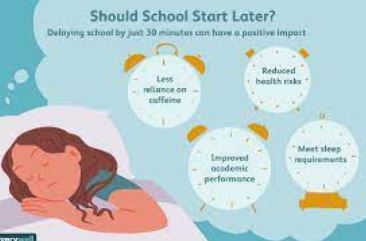The Time is Fine

Debates over the length of school days and how early they should start are never-ending, largely because there is no clear and obvious answer. Because of Covid especially, the start time for school at Kingsway has constantly changed over the last few years, disrupting schedules for everyone. It went from starting around 7:15 to starting closer to 9:30 during the pandemic and virtual learning, to a now seemingly set time of 7:54. Yet no matter what time school starts, kids are always seen yawning in the midst of conversation, dozing off during note-taking, and zoning out while taking tests. Up in Trenton, “Two lawmakers from New Jersey are proposing a bill to prohibit early start times for high schools no earlier than 8:30 a.m…” (Johnson). So what really is the best time for school to start, and should Kingsway consider starting a half-hour later, at 8:30?
When students have jammed-packed schedules with school, homework, sports, extracurriculars, and jobs, it is well known that many high schoolers do not get enough sleep, and early first bells play a big part in that. So the argument is quite simple: Starting school later leads to healthier, happier students.
According to the CDC, “During puberty, adolescents become sleepy later at night and need to sleep later in the morning as a result of shifts in biological rhythms”. Therefore, it is logical to start school later in order to best take advantage of when students are the most alert. “The combination of late bedtimes and early school start times results in most adolescents not getting enough sleep” (CDC). So starting school as late as possible must be the best solution to this epidemic, right?
While it is easy to support the idea that school should always start later so that students can get more sleep on a nightly basis, in some situations, it is just not practical. Of course, students’ health should be prioritized in every way possible, but if a school has already taken large measures to ensure this, how much farther can they reasonably go?
In the case of Kingsway, the school has already taken measures over the past 4 years to give students more time to rest by progressively starting school later over the years. In the 2018-2019 school year, students often woke up before 6 am as the first bell of the day rang around 7:15 each morning. Then, when Covid hit, school days were shortened and days didn’t start until closer to 9:30, and students really felt the benefit of starting late, but obviously, starting school that late and still fitting in a full day of education is unrealistic, to say the least. Now, in the first full, closer to normal school year since the pandemic started, the first bell doesn’t ring until just before 8 am, at 7:54.
So the school has taken action to ensure students get more sleep by starting the day 40 minutes later than it did Pre-Covid. Choosing how early to start the day is a real balancing act, and Kingsway has done a really good job of balancing it in a way that still benefits students.
Pushing back the start time of the school day to 8:30 affects a lot more than just giving students an extra half hour of sleep. Pushing back Kingsway’s start time, even more, would greatly affect the times that our sports teams can run their practices and games, potentially causing shorter practices and giving athletes less preparation and stretching time before games. But it’s not just this either. Potentially, “…high schoolers won’t be able to get jobs if they get out later”. On top of this, “The prospect of added bus costs—moving start times can disrupt the equilibrium between elementary-, middle-, and high-school transportation schedules—are another consideration” (Putterman).
Just to be clear, no one is arguing that students’ sleep, education, and health shouldn’t be prioritized over all else. Schools around the country really should heavily consider pushing back start times as far as they reasonably can. Contrarily, since Kingsway has already succeeded in pushing back the start time of the school day an adequate amount, pushing it back another half hour could lead to unforeseen repercussions. In a situation like this, everything must be considered, and the fact that the school has already worked hard to push back the start time from what it was a few years ago shows that they had a reason for only pushing it to around 8 am instead of 8:30.
There’s not much of a debate nationwide on whether or not students’ health should be prioritized and the start times of school days should be pushed back. The vast majority is in agreement that the first bell should be held off for as long as reasonably possible in order to ensure that students are in the best possible mindset to learn. But in a school district that has already worked furiously to optimize students’ abilities and has already pushed back the start time of the school day forty minutes from what it was, is there much more the district can realistically do?
When the decision was made to start the day at 7:54, there was a reason that time was chosen over 8:30. It’s not that a start time of 8:30 was not considered, but rather that the very specific time of 7:54 was found to be the optimal balance of prioritizing students’ health and making sure all after-school activities and factors can be carried out smoothly.
